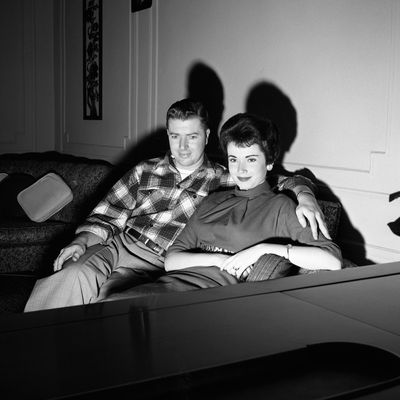
Earlier this year, a British company announced its plans to begin peddling couples’ “commitment rings,” pieces of wearable tech that sync to streaming services and block access to certain shows until both rings (and, therefore, both partners) are nearby.
Is this overkill? Yes. Does this feel like a creepy, paternalistic invasion of privacy, and also a little like a digital chastity belt? Also yes. Are the rings even cute? Not in the slightest. But Cornetto (an ice-cream manufacturer, weirdly) has also hit on something: Netflix cheating — sneaking in some solo episodes of a show you ordinarily watch with your significant other — is both a crappy thing to do and a hard thing to resist. (And “most disastrously,” Maureen O’Connor has noted in the Cut, “Netflix keeps a record when you cheat” — the “recently watched” list is ready and waiting to give you away).
The other, happier side of this coin, of course, is that when you do manage to keep your binge-watching impulses in check until date night, marathoning a show together can be an easy, cozy way to feel connected. “In modern-day romance,” the New York Times wrote last year, “resisting the impulse to binge so that you may watch with a lover is the new equivalent of meeting the parents or sharing a sober kiss.”
But in some cases, that intimacy comes from more than just spending hours on the couch together. When couples don’t have many mutual friends, a new study in the Journal of Social and Personal Relationships argues, making it a point to share a TV show — or read the same book, or plan a movie night — can still make it feel like you’re part of the same social world.
For the study, college students who’d been dating a partner exclusively for at least four months (the average relationship length was just over a year and a half) answered survey questions about the quality of their relationships, how many friends they shared with their partner, and how how much time they spent together on certain activities each day. The volunteers who shared a social circle with their partners also tended to report the strongest relationships, a finding that isn’t all that surprising — past research has shown that couples tend to feel more satisfied, more committed, and more optimistic about the future when both partners run in the same circles.
But among those whose friend groups didn’t overlap, there was another, separate factor that predicted closer, healthier relationships: spending more time on, in the words of the study, “shared media experiences” — possibly because, as the researchers wrote, consuming the same show or film or book “leads people to feel a shared connection to the social world” on the screen or the page. Without a real-life social network to bind you, in other words, it’s fine to use a fictional one for the same purpose — and even to think of the characters as your real friends.




